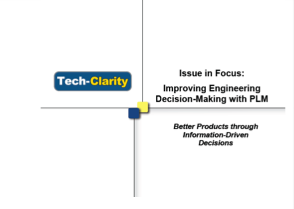 Issue in Focus: Improving Engineering Decision-Making with PLM – Better Products through Information-Driven Decisions discusses the importance of enabling engineers and product developers to make informed decisions when developing products. The report discusses how PLM must provide efficient and rapid access to product information – in context – so engineers can make optimal, information-driven decisions and develop better, more profitable products.
Issue in Focus: Improving Engineering Decision-Making with PLM – Better Products through Information-Driven Decisions discusses the importance of enabling engineers and product developers to make informed decisions when developing products. The report discusses how PLM must provide efficient and rapid access to product information – in context – so engineers can make optimal, information-driven decisions and develop better, more profitable products.
Please enjoy the summary below, or click the report or title to download the full PDF (free of charge, no registration required).
Table of Contents
- Introducing the Issue
- Increasing Challenge of Engineering Decisions
- Addressing The Product Information Challenge / Opportunity
- Enabling Engineers to Make Timely, Optimal Decisions
- Taking it to the Next Level – Supporting NPD
- Conclusion
- Recommendations
- About the Author
Introducing the Issue
Making poor product or portfolio decisions can lead to devastating impacts on fiscal performance, Likewise, making a poor engineering decision during product development can lead to catastrophic consequences. But truth be told, most decisions an engineer makes on a daily basis don’t have life or death implications. In fact, no one decision will probably be the difference between product success and failure. The combined impact of all of the decisions required to develop even a simple product, however, has a significant impact on the performance, quality, reliability, cost, compliance – and ultimately profitability – of a product.
Engineering is essentially applying knowledge and science to create solutions to problems. In product development this means making decisions to address a set of requirements or needs. Engineers make thousands of decisions in product development, from big ones down to the small, everyday ones. For example, an engineering leader from GM explained at a recent conference that developing an automobile is a process consisting of over 25,000 decisions. Each of these decisions is important on its own, but more importantly the decisions are inter-related and decisions made early in product development can have a dramatic impact downstream.
Given the important role of engineering decision-making in product development, manufacturers should treat it as a core competency. Manufacturers must enable decision-makers to make better, more confident decisions. They should also enable engineers to make decisions efficiently and get them right the first time to optimize product development time, reduce time-consuming design rework, and improve time to market. Optimizing engineering decisions is ultimately about driving greater success and profitability of products.
Improving decision-making is even more important today as engineers face unprecedented complexity in product development. At the same time, competition is much more global and competitive advantages are easier to copy. What was a “good enough” decision ten or fifteen years ago will not suffice today. The bar has been raised. Companies are targeting “right the first time” decision-making to make more optimal, confident decisions based on better information. The engineering decision-making processes and tools of over a decade ago will not suffice either – they must evolve to enable data-driven decisions to optimize product designs.

